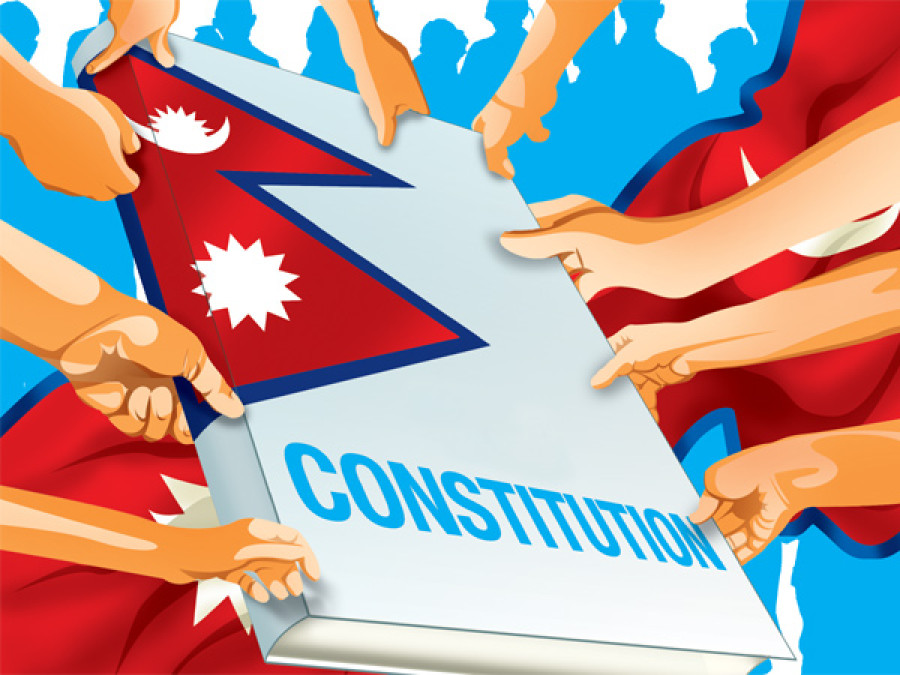Opinion
The path ahead
By promulgating the new constitution, Nepal has overcome one challenge, only to be confronted by new problems
Gopal Thapa
Last week, the President of Nepal finally promulgated the Consitution of Nepal 2072 quelling all doubts of whether the nation would ever get a statute written by a Constituent Assembly. This rare occasion should have been followed with a nationwide celebrations. But the inability of the three big parties to accommodate the concerns of the Tarai-Madhes parties and other ethnic groups dampened the celebrations. It would have been an icing on the cake if only the Madhesi Janadhikar Forum-Loktantrik Chairman Bijaya Kumar Gacchadar, one of the main architects of the 16-point agreement, had been retained on board by the three major parties. The inability of the trio to do so was arguably the weakest link in the chain of events. Nevertheless, as a bird in the hand is worth two in the bush; it is better to have a constitution than not to have one at all.
Existing hurdles
Every change is invariably accompanied by challenges. Thus, for every change to last, it is essential to overcome the challenges inherent in it. Nepal now stands on the cusp of change. And change, especially if it is a radical one, may not always be pleasant. They might even be painful and traumatic because every change seeks to deconstruct many deeply entrenched social, economic and political prejudices. And those benefitting from the status quo will always resist change.
In Nepal, the scale, intensity and scope of the changes currently taking place in the country are monumental, with far-reaching consequences. They will completely alter the political, economic and social profile of the country. First, the new constitution symbolises Nepal’s transition from a unitary to a federal state. This transition will be an arduous and lengthy process. The restructuring of the state, the naming of the federal provinces, delineation of borders, establishing provincial administrative structures are complex, intricate and time-consuming processes. Furthermore, institutionalising these new changes in society, as heterogeneous and diverse as ours, will probably be one of the biggest challenges that lie ahead. Such changes may prove to be good or bad for the country, depending upon the ability of the leadership to oversee their smooth and effective implementation.
Resolve the crisis
It is often said that it is more difficult to manage peace than winning a war. In a war, the enemy is starkly visible and known, whereas the enemies during peaceful times are unknown and pervasive. The post-constitution peace process will, therefore, have to face many such known and unknown enemies. The dissatisfaction of the Adivasi-Janajatis and Madhesi communities will have serious repercussions for Nepal, domestically and internationally. Being complacent and impervious when it comes to dealing with these dissenting voices are sure signs of a bigger turmoil in the future. The situation is further worsened by the fact that the moorings of the new constitution are extremely tenuous.
Normally, a new constitution benefits from the best of the past, dovetails them with the present, and then prepares an appropriate political, economic and social profile for the peace and prosperity of the country. Unfortunately, our new constitution fails to make a balanced and objective assessment of the past. It merely glorifies the armed revolution while ignoring everything else. And despite nationwide objection to ‘secularism’, it has found a place in the constitution. History is littered with examples of intolerant constitutions, bereft of a clear roadmap and vision, that have lead pushed many countries to destruction and disintegration. Furthermore, the statute makes many promises to the people without offering a clear way to attain them.
The leaders of our key political parties must take a cue from history. The continuing agitations and protests in the Tarai, followed by the message from our southern neighbour must make our leaders more serious about resolving the current crisis. The support of India is vital for the implementation of this constitution. But India has not welcomed the new statute because it fears that the violence in the Tarai, if not contained in time, might escalate and spill into its side of the border. Therefore, accommodating the dissenting voices would also help to allay the concerns of our immediate neighbour.
Way forward
By promulgating the new constitution, Nepal has overcome one challenge only to be confronted by a new set of political, economic and social challenges. To deal with these new challenges, the country requires a new leadership, which is honest, non-nepotistic and has a clear vision on domestic and international matters. Nonetheless, the immediate internal challenge is to bring the agitating Madhes-based political parties and other ethnic groups into the political process, through sustained and peaceful negotiations. To avoid further confrontations, the three major political leaders should take the initiative to invite the disgruntled forces for talks. But again, negotiation is not a one-way traffic; a recalcitrant attitude of either of the two negotiating parties will not help. Both the sides should create a favourable environment for talks and approach one another with utmost flexibility.
Ultimately, the constitution is only a means not an end. Its success, or setback is contingent upon its implementation on the ground. Durable peace, political stability and a committed and honest political leadership, imbued with a high moral integrity and empathy is important. But many of our current leaders suffer from hide-bound mindset. So the promises made to the people in the new constitution might not be implemented. Only young, uncorrupt, informed and honest politicians, at the helm of politics, may be able to manage the post-constitution challenges effectively. Only such a leadership can ensure durable peace, stability and prosperity in the country. As ‘eternal vigilance is the price of liberty’, even as we celebrate the arrival of the new constitution, we, the people, must closely and continuously monitor the performance of the government and its operational agencies to make sure that the statute is implemented properly. We must not forget that it is our constitution, the people’s constitution.
Thapa is a former Chief of Protocol at the Ministry of Foreign Affairs




 27.48°C Kathmandu
27.48°C Kathmandu





.jpg&w=200&height=120)





